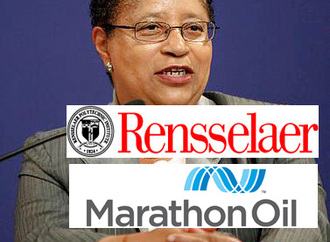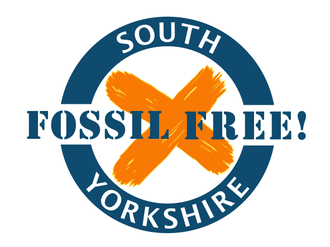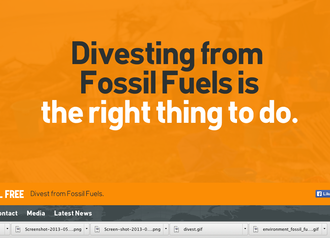-
Divest USU from Fossil Fuel IndustriesUtah State University's invested funds are collected from donations (called ‘endowments’), and the returns from those investments are used to pay USU's recurring budget costs. As of 2022, USU’s endowment was approximately $715 million. Those endowments are invested across many companies, particularly energy companies, which are seen as promising investments, despite the many negative effects they have on the environment and human health. Some of the worst-polluting companies are those listed on the Carbon Underground 200. Divesting from them would not put USU in financial jeopardy as quality investment options are available. Further, it would send an important message that USU is willing to do what it takes to protect the campus community from the threat of climate change. Return differences between portfolios excluding and including fossil fuels are statistically insignificant, and other organizations, including major newspapers, universities like U.C. Davis (a land-grant institution) and Unity College, and Catholic churches- have divested without negative financial consequences. As institutions of elevated education, Universities have a responsibility to their students, employees, and local communities to divest from fossil fuel industries.114 of 200 SignaturesCreated by Cristina Chirvasa
-
Fossil Free Stellenbosch UniversityClimate change is a global crisis. Its implications will impact every global citizen, with the most disastrous consequences being felt by the impoverished. As stakeholders of Stellenbosch University, we as students must require the university's administration to invest in our future, and the future of our children, by divesting the university's endowment funds from fossil fuels and reinvesting them into sustainable funds. As members of the Stellenbosch community, we must ensure that the town's university - which has a substantial impact on Stellenbosch's development - administrates its funds sustainably, to ensure its long-term financial health. And as citizens of South Africa - a region threatened by extensive drought due to global warming - we must hold one of the wealthiest public universities in the country to account for funding climate change.152 of 200 SignaturesCreated by Anais Breytenbach
-
Für nachhaltige Finanzen der TU Darmstadt“Die TU Darmstadt übernimmt Verantwortung auf dem Weg einer nachhaltigen Entwicklung.” So steht es auf der Website der TU. Auch der Kanzler der TU Darmstadt Dr. Manfred Efinger bekennt sich zur Nachhaltigkeit, wenn er sagt, “nicht nur die TU Darmstadt als Institution, sondern jeder von uns einen wesentlichen Beitrag leisten kann, den ökologischen Fußabdruck zu verringern” [1]. Zum nachhaltigen Handeln gehört auch klimagerechtes Investieren. Doch leider ist es nicht transparent, nach welchen Richtlinien die TU ihr Geld anlegt, obwohl sie sich selbst in der Rolle als Bildungsförderin sieht. Heute gängige Investitionspraktiken ermöglichen die weitere Zerstörung unserer Lebensgrundlagen. Mit einer öffentlichen Anlagerichtlinie, die Investitionen in klimaschädliche Industrien, wie der fossilen Industrie ausschließt und Investitionen in gemeinwohlorientierte Sektoren stärkt, würde die TU einen wesentlichen Beitrag zu den notwendigen gesellschaftlichen Veränderungen leisten und wäre ein Vorbild für klimagerechtes und zukunftsweisendes Handeln. Wir fragen uns, warum gibt es dann noch keinen Divestment-Beschluss der TU Darmstadt, um Anleihen in fossile Unternehmen auszuschließen? Warum gibt es keine Anlagerichtlinie, die Klimaschutz, Gemeinwohl und Gerechtigkeit stärkt? Die Universitäten in Münster, Göttingen und Freiburg haben es gezeigt, dass Uni-Divestment möglich ist. Und schon 2019 hat das Land Hessen beschlossen, die Mittel seiner Pensionsfonds künftig nach nachhaltigen Kriterien anzulegen. Der damalige hessische Finanzminister Dr. Thomas Schäfer zeigte sich überzeugt, “dass langfristige Wertschöpfung nur in einem wirtschaftlich effizienten, nachhaltig gestalteten globalen Finanzsystem möglich ist” [2]. Ein Divestment-Beschluss der TU Darmstadt ginge weit über den symbolischen Wert hinaus. Selbst wenn aktuelle Investitionen nicht von solch einem Beschluss betroffen wären, wirkt diese Entscheidung für kommende Investitionen und als Vorbildfunktion für die Universitätslandschaft. Wir alle haben die Verantwortung die schlimmsten Folgen der Klimakrise abzuwenden. Die TU Darmstadt muss mit einem öffentlichen Divestment-Beschluss und einer zukunftsweisenden Anlagerichtlinie ihren Beitrag leisten. English version: With this petition we call on the Technical University of Darmstadt to: 1. not make any new investments in corporations that make profits from the extraction of fossil fuels (coal, oil, natural gas). 2. to withdraw own shares in direct and indirect investments in such companies, shares, mixed funds or corporate bonds within the next 2 years, i.e. to disinvest, and instead to reinvest in a socially responsible way. 3. to adopt and publish a sustainable investment policy that meets the above criteria. Why is this important? "The TU Darmstadt takes responsibility on the path of sustainable development." That's what it says on the TU's website. Its chancellor, Dr Manfred Efinger, is also committed to sustainability when he says that "not only TU Darmstadt as an institution, but each of us can make a significant contribution to reducing our ecological footprint" [1]. Sustainable action also includes climate-friendly investment. But unfortunately it is not transparent according to which guidelines the TU invests its money, even though it sees itself in the role of promoting education. Today's common investment practices enable the further destruction of our livelihoods. With a public investment guideline that excludes investments in climate-damaging industries, such as fossil fuels, and strengthens investments in sectors oriented towards the common good, TU would make a significant contribution to the necessary social changes and would be a role model for climate-friendly and forward-looking, sustainable action. We ask ourselves: Why then is there still no divestment resolution by TU Darmstadt to exclude bonds in fossil companies? Why are there no investment guidelines that strengthen climate protection, public welfare and justice? The universities in Münster, Göttingen and Freiburg have shown that university divestment is possible. And already in 2019, the state of Hessen decided to invest the funds of its pension funds according to sustainable criteria in the future. Dr Thomas Schäfer, Hessen's Finance Minister at the time, expressed his conviction "that long-term value creation is only possible in an economically efficient, sustainably designed global financial system" [2]. A divestment decision by TU Darmstadt would go far beyond symbolic value. Even if current investments were not affected by such a decision, this decision has an effect on future investments and as a role model for the university landscape. We all have a responsibility to avert the worst consequences of the climate crisis. The TU Darmstadt must make its contribution with a public divestment decision and a forward-looking investment guideline. Wer wir sind / Who we are: https://world.350.org/fossilfreedarmstadt https://www.instagram.com/fossilfreedarmstadt/ https://twitter.com/FossilFree_DA Quellenangaben / Sources: [1] https://www.tu-darmstadt.de/universitaet/mitten_in_der_gesellschaft/nachhaltigkeit_tu/index.de.jsp [2] https://hmulv.hessen.de/pressearchiv/pressemitteilung/pensionsfonds-investieren-nachhaltige-aktienindizes-0 Bildnachweis / Images: https://www.tu-darmstadt.de/studentsoftudarmstadt/bachelor_lehramt/faq.de.jsp170 of 200 SignaturesCreated by Fossil Free Darmstadt

-
Dr. Shirley Jackson, please stop working for big oilDr. Jackson, you are being asked to step down because of the impact that Marathon Oil has on environmental health issues at a local, national, and global level. LOCALLY Only 8 miles from your home and RPI, for example, the health and welfare of people who live in Albany (including RPI students) are at risk because highly volatile Bakken Crude -- which Marathon Oil produces -- rolls through their communities -- in rail DOT-111 rail tankers that the National Transportation Safety Board itself says put communities at risk. Explosions and fires have already wreaked havoc in communities around North America, including the massive blast in Lac Megantic, Quebec that killed 47 people. These “bomb trains” filled with volatile crude pass within hundreds of feet of densely populated residential areas, and often sit for days on tracks just behind public housing complexes. NATIONALLY The shale gas boom is also expanding fossil fuel production and transport, and creating new problems and risks across the United States. Marathon Oil is active in the Eagle Ford Shale Play near San Antonio, for example. More than 7,000 new oil and gas wells have been drilled in the region since 2007, and thousands more are planned, resulting in dramatic air pollution and associated ill health. Many RPI students and alum are directly impacted because of shale gas developments in their home communities. Meanwhile, research demonstrating often irreversible damage to the environment and human health because of the long chain of activity associated with the shale gas boom continues to build. RPI could play an important leadership role helping translate this research into public policy, firmly grounded in science. GLOBALLY Fossils fuels also create tragic global challenges, with Marathon Oil again bearing notable responsibility. The United Nations reports that that climate change already kills hundreds of thousands of people per year, and that the world’s poorest people are the most vulnerable. Climate change is also creating political instability, driving people across borders and creating diplomatic crises that show no sign of resolution. Fossil fuels -- and Marathon Oil -- are deeply implicated in these tragedies.402 of 500 SignaturesCreated by Igor Vamos
-
Reduction of Plastics in Panda ExpressPlastics that we use and fail to recycle end up in the landfills, and often times into our oceans where they congregate into gyres which the Gyre Cleanup Project describes as a “naturally occurring vortex of wind and currents that rotate in a clockwise direction in the northern hemisphere and [counterclockwise] in the southern hemisphere.” These gyres attract the plastics to the center of the gyre and, over the years, have created what we call the Great Pacific Garbage Patch. Once reaching the center, and even before, the plastics begin to break down into microplastics that enter the ecosystems and end up concentrating in the top of the food chain through biomagnification this can cause the animals to starve or can kill them through lead poisoning. The best way to fix this problem is through preventing the plastics from ever reaching the oceans, and reducing our overall use of plastics. This is easiest in cases like Panda Express where their plastic products are easily replaced by less harmful alternatives, like cardboard boxes and reusable containers.13,138 of 15,000 SignaturesCreated by Ben Pearson
-
UMass Alumni: Urgent call for Trustees to vote to Divest from Fossil Fuels on December 9, 20151. Climate Change - Global warming is making the seas rise, the glaciers melt, and wreaking havoc for millions of the poorest people on the planet; 2. Keep Fossil Fuels in the Ground - It is essential that the oil, natural gas, and coal companies leave 80% of the available fossil fuels in the ground to keep the temperature from rising more than 2 degrees Celsius; 3. It is a Moral Responsibility - The UMass Board of Trustees has a moral responsibility to do everything it can do can to ensure that today’s and tomorrow’s University of Massachusetts’ students have a good life on an inhabitable planet as “global temperatures are running far above last year’s, all but guaranteeing that 2015 will be the hottest year in the historical record.” (“2015 Likely to Be Hottest Year on Record,” by Justin Gillis, The New York Times, October 22, 2015) 4. Time to act is NOW - as world leaders will be in Paris in December, while the Board of Trustees are in Lowell, to approve plans to dramatically reduce their nation’s fossil fuel consumption. Since President Meehan has stated that he wants the University of Massachusetts to become one of the top 20 universities in the country, this is a perfect opportunity for the University to be a leader on the most important issue of the 21st Century - Climate Change. Other higher education institutions like Stanford (Coal only) and University of California (Coal and Tar Sands Only) have voted for partial divestment. UMass can show it is a leader, role-model, and world class institution by voting to fully divest of all types of fossil fuels including Coal, Tar Sands, Oil, and Natural Gas from its investments - both direct and indirect (i.e. co-mingled funds).218 of 300 SignaturesCreated by Bryan Moss
-
Ask South Yorkshire Pension Authority to invest ethically and divest from fossil fuelsSince its formation in 1988, South Yorkshire Pensions Authority has worked hard on behalf of its nearly 140,000 members to provide them with a safe and secure future in retirement. Yet while ever it invests in unethical companies or industries, including fossil fuels and tobacco, the Authority is putting these achievements at great risk, by undermining long-term commitments to maximise pension fund investments and to provide good service to fund members. (The over 300 employers contributing to the Authority's schemes are also at risk, as it is they who will ultimately meet any shortfall in the cost of providing scheme benefits to retired members.) The South Yorkshire Pensions Authority (SYPA) which manages the Local Government Pension Scheme has £259m invested in companies with fossil fuel and fracking connections such as Shell, BP and Glencore, 4.25% of its £6.1bn holdings (as at Mar 2016). It also holds investments in companies which fail to balance their focus on profit with the social and environmental responsibilities expected in the modern day. We believe it is morally indefensible to invest in companies that destroy our climate and so leave to our children a world where life as we know it is unsustainable. And that it is financially irresponsible to invest in such a high risk sector where the experts agree that the assets are currently wildly overstated and where share prices are certain to plummet.701 of 800 SignaturesCreated by Janet paske
-
Utrecht University: Go Fossil Free!Utrecht University facilitates some of the best research institutes on sustainable development and climate change in the world, and supplies its students with top-ranking education on the topics. Additionally, it opened the Green Office Utrecht in 2013 to create a platform for students and staff where sustainable ideas are shaped, plans are put together, and projects are launched; all with the objective of making the University more sustainable. Yet Utrecht University and its employees are still contributing to climate change indirectly. Utrecht University invests in the fossil fuel industry indirectly through Rabobank, and its staff and faculty do so through the pension fund ABP, which holds over 33 million euro in fossil fuel investments, in companies in like Shell. Investments in fossil fuel companies are morally wrong, because they endanger the future of people and our planet and block the transition to a sustainable energy network. These investments are not only unethical, but also risky. To achieve the UN’s target of keeping global temperature rise below 2°C, around 80% of the fossil fuel reserves currently mapped can never be burnt. Leading research warns of the ‘Carbon Bubble’, much like the Dot-Com Bubble of the 90s, where fossil fuel investments will quickly lose their value as a result of global climate change policy. The ‘Carbon Bubble’ poses a risk for the University’s financial health and that of its employees’ pensions.307 of 400 SignaturesCreated by Utrecht University Fossil Free

-
OIL FREE SEAS AustraliaThose we have elected are failing the Australian people and they are failing the natural world. They are allowing the cruel and unnecessary slaughter of sea creatures and the ruin of undersea habitats. We demand our Governments manage natural resources and the global commons solely in the best interests of present and future citizens. Our oceans should not be exploited by individual nations or corporations but held in trust for the benefit of all and for future generations.787 of 800 SignaturesCreated by OIL FREE SEAS Australia
-
Dunedin City Council: Be the first NZ city to Divest from Fossil FuelsKia Kaha Dunedin City Council Dunedin City Councillors will vote whether to divest from fossil fuels sometime between April-May 2015. Oil Free Otago strongly support our Councillors and urge them to do the right thing for our climate and our future. The DCC voted in May 2014 to endorse a policy direction to develop a Socially Responsible Investment Policy for its Waipori Fund, which would intend to exclude direct investment in fossil fuel extraction, tobacco, armaments, gambling and pornography. The DCC is currently writing up a document to be presented to Council for a final vote, confirming whether Dunedin will truly become the first New Zealand city to divest from fossil fuels. Kia kaha DCC! Be the first NZ city to Divest from Fossil Fuels! We support you! Sign this petition supporting DCC's vote to divest! Like & Share on Facebook: Dunedin Divests! Write to the DCC ([email protected]) to express how important it is that the motion to divest be adopted! Contact [email protected] to get involved! Check out who's already divested: http://gofossilfree.org/commitments/310 of 400 SignaturesCreated by OilFree Otago
-
No more foul play! No more BP greenwash at the Commonwealth Games.BP is an official partner of this year's Glasgow Commonwealth Games. For a small contribution, BP paint themselves as generous, socially responsible and "green" - when nothing could be further from the truth. - BP will 'donate a tree' for each participant in its carbon offsetting scheme, but the amount of CO2 they will absorb is almost nothing when compared to BP's emissions worldwide. - BP have set up a 'Young Leaders' scheme but it is young people who will have to deal with their legacy of runaway climate change and oil spills. - The US has brought in sanctions against the Russian-owned oil company, Rosneft, but BP have clung to its 19.75% share in the company. - BP have nestled its brand alongside our elite athletes in order to keep their toxic legacy in the Gulf of Mexico and attempts to drill in the Arctic out of people's minds. It's time to stop the greenwash and deny BP the role of 'corporate partner' at all future sporting events!318 of 400 SignaturesCreated by Art Not Oil
-
Stop Fracking in Ohio's ParksThree years ago Governor John Kasich approved new state legislation that would permit hydraulic fracturing in Ohio's State parks. 3300 acres of park property have already been set aside for Natural Gas and Oil wells. These wells endanger thousands of residents every day while operating, not to mention the lasting impact for years after the well has been drilled. We must stand together to prevent the destruction of our state parks.26 of 100 SignaturesCreated by AJ Iarussi











